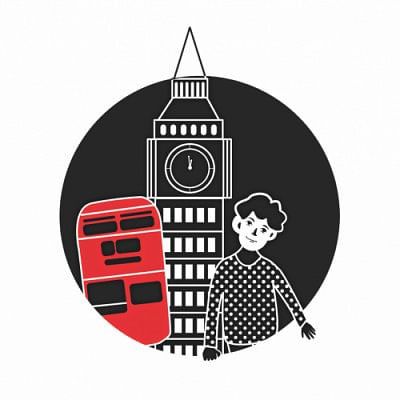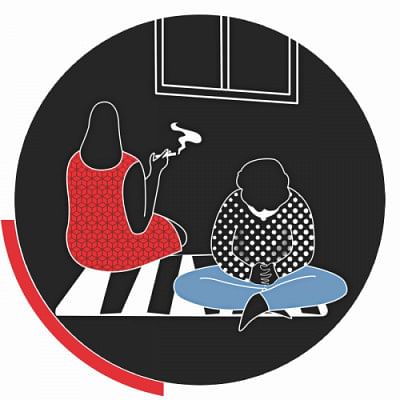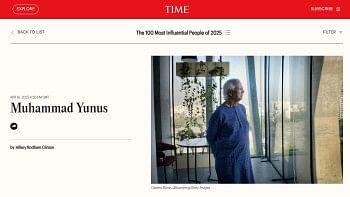I AM IN LONDON

Arriving at Heathrow Airport made Robiul fidgety. He'd been waiting over an hour to pass the immigration desk. Back home, he'd heard a few unpleasant stories, where immigration officers would refuse entry to anyone they were not satisfied with, even if that passenger had a visa.
Robiul had graduated with a degree in English and could speak the language just fine, or so he thought. He hoped it would be an advantage right now. In the first-time visitor queue, he tried being cool, but it was with damp palms he clutched the necessary papers.
Why are you taking this course?
If I achieve this diploma that's leading to MBA, I'd get a very good job and salary when I'm back in my country. A British degree is highly…
But you've studied English, so what good is an MBA?
Well...
He wondered if he would come across that last question. It was tricky, but his answers were prepared.
Finally, his turn came. The officer was forty-ish; a red-faced man with thinning blond hair. Robiul handed over his passport and tuberculosis certificate.
“Where did you get the money for your course?” The officer looked him over.
“I worked as a teacher, I saved the money,” Robiul answered confidently.
The officer stamped his passport, handed it back with his right hand, and held the little entry gate open with his left.
Was that all? Robiul looked at the officer, then at the gate.
“Thank you,” he said after a moment. He clenched his fist and quietly punched the air. “Yes, I am in London.”
It was the name. He had to do it. He was, after all, in London. His flatmate had taken him to Stratford to open a bank account. When their turn came, he heard his flatmate's name being called.
“My-boob.” A red-haired young woman with plump breasts smiled at them from her seat.
They sank onto the sofa before her desk. She looked comfortable, and so did his flatmate, Mahboob. Robiul's face flamed red. Because of the “Britishisation” of Mahboob, the “h” had become silent. It should have been pronounced “Maahh-boob.” He gazed determinedly at the freckles on her forehead.
In that moment, he decided to “Britishise” his name, shortening Robiul to Rob. In fact, if possible, he would legally change his entire name, Mohammed Robiul, to Rob Ryan. The religious group he was born into had a particular fondness for naming their male children either Abdul or Mohammed. And, quite unlike his home country, where people were called by their last names, the British preferred being addressed by their first names.
Later, when he figured out how long the legal name-changing procedure would take and the effort involved, he was horrified. Still, he didn't wish to run the risk of the Home Office pushing him into a darkened room for a prolonged interrogation as a suspected Islami terrorist.
“Call me Rob,” he introduced himself.
The first few weeks brought unexpected challenges. Rob found his eyes drifting helplessly to women's cleavages and their near-naked thighs. It took months for him to get used to the many and varied displays of female flesh. Still, he would strip off his newcomer outfit sooner than most. He had to.
One afternoon, he popped into a small Bangladeshi store on Brick Lane to top up his travel card. When he was done, Rob pointed to the yoghurt in the refrigerator and asked, “How much is it?”
The shopkeeper, a young lad with a skin fade haircut and a chinstrap beard—very common in Sylheti folk—replied, “Ten quid.” With a bit of a condescending smile he added, “Can you afford it?”
“I'll come back later,” Rob abruptly left the shop. He hadn't quite grasped the shopkeeper's last question.
For someone fresh off the boat, the British accent was tough. Most certainly, Sylheti-Cockney was no exception, if not the worst of all accents to understand. But, there had been something needling about the shopkeeper's manner.
What exactly did he mean? Rob pondered as he walked the grimy footpath. Understanding dawned. He stopped. ''Bloody asshole,'' he spat on the concrete.
The first day of college arrived in a two-floor section of a multi-story building located at Holborn. In orientation class it occurred to Rob that he might well have travelled in time to 1947, when Bangladesh, India, and Pakistan were all part of the same country.
He watched the other students. He noticed something: everyone was of Indian heritage. There were no exceptions, not even the teachers and school employees.
Am I really in London?
Back home, he had often imagined himself in a foreign school, surrounded by students from every corner of the globe. Different races, languages and cultures – the idea had always thrilled him. His eyes roamed the faces in the room as he waited expectantly for a flicker of excitement. Nothing. A skeletal girl of indeterminate age stared back at him. She looked ordinary, worn, mundane. Rob sighed.
Relief was overwhelming when he later left the classroom. Diverse faces passed around him on the frenetic streets outside. It was oddly comforting.
Whitechapel and its surrounding areas had the biggest Bengali community in London. There, Rob visited a few agencies he'd heard could help him find a job. The small stuffy rooms, always heaving, were damp and dirty. In almost every office, the person in charge was chewing betel nut, against a backdrop of peeling walls. They never missed an opportunity to take advantage of hapless jobseekers, preferably by skimming hefty commissions in return for “services.” Rob soon gave up on them.

One evening, on a friend's recommendation, he landed a work trial at an Indian restaurant in central London. While he confidently balanced a tray of bottled Kingfisher beer in one hand, he had, for a fleeting moment, imagined himself as a real waiter. Placing the drinks on the table, the tray tilted; one by one the Kingfishers slid off, saturating the girl's top and puckering her pale skin. He was invited to leave.
Feeling miserable, he slunk to Soho, where Mahboob worked at a small book shop.
“It's hard to get a job these days,” Mahboob tried to soothe him. “Keep trying, bro. You never know.”
Rob gazed intently at some of the books. Due to the shop's location, it shelved a wide range of adult reading. His eyes fell on one title: The Big Book of Pussy. It reminded him of the words of a fellow student, a Pakistani, who had warned him to stay away from white women, because they apparently used their pets for erotic pleasure. He ached to clarify this point with Mahboob, who was by then serving a customer. Instead, Rob found himself hating the dogs that received repeated sweet kisses from adorable, full-lipped women.
When he had finished, Mahboob sighed. “This is London life,” he said, “look at me; it's been six years I'm here, and still I'm effing studying.”
“Why is that?”
“Well, I have to. I don't wanna go back to that country. Just four more years, bro. I'll get my residency and no more effing school then.”
A month passed. Rob landed a cleaning job in central London through an English job-seeking agency. In the interview, the Latvian cleaning manager – a bone-thin, blonde, freckled woman, in her mid-thirties – asked a single question in a strange accent, “Do you have cleaning job experience?”
He was candid. “Not exactly,” was his reply, “but at home, I clean my own toilet.”
He woke up at 5:20 am to start work at 6 am at the largest department store on Oxford Street. The job mainly involved sweeping, mopping, and vacuuming. The morning shift lasted three hours and his second shift began at 3 pm. Most of his co-workers were Filipino, who spoke broken English. Four Bangladeshis were among them, newcomers like him. Soon, he found himself chatting to a young Bangladeshi man with a thoughtful face, who was assumed to be a well-brought-up city boy. On their way home, the city boy, hands in his pockets, stopped in the middle of the pavement. His eyes widened when Rob spoke of his education and qualification.
“You got a master's from the best university back home; why the hell have you come here? To do this shit job?”
“I wanted a change, and I love to travel.” Rob did his best to sound convincing.
“I was doing my bachelor's from a no-good university,” the city boy said. “And I know I won't get a good job there. So, I came to London to make my fortune.” He paused to inspect one of Oxford Street's Christmas decorations, and added, “But I get your point.”
Rob gave a tight smile.
College was a bore after two weeks. There were three courses and three teachers; a Bangladeshi, an Indian, and a Ghanaian. Staying interested in their classes was a struggle, and their ever-changing accents would at times irk Rob. At the British Council back home, he had come across what he'd considered to be “proper” British instructors. A longing to get under the skin of this cold and foreign land gnawed at him.
It was with relief that the college closed for the Christmas holidays. The department store had become busier by the minute and he was offered plenty of hours, often from 6 am to 9 pm, which he grabbed. This meant Rob only had time to be either on his feet at work, or at home in bed. The department store became his second home. At night, when he arrived at the flat and found his bed, he crawled under the covers and slept like the dead.
On his days off, Rob called his parents back home. Conversations were short and more or less same.
“It's too busy here. I'm good, working hard. I'll send some money next week. Don't worry about my loan.”
“Do you like working in the restaurant?” they asked. When it came to his employment situation, Rob was sketchy.
“It's okay. You get free food at the end of the shift.”
He yawned and stretched for a while. Finally, from the warmth of the quilt, he rose to his feet. He cooked, washed, and cleaned the flat that he shared with four other guys. His balding roommate joked, “Today our kitchen and toilet will be super clean.”
After taking his meal, Rob returned to his den, curling up under the quilt.
Calling Rob, over.
Yes, Rob speaking, over.
Rob, can you go to Godiva now? A customer threw up on the floor. Over.
OK, I'm on my way.
Thank you, Rob.
His eyes shot open and he weakly flailed about, before realising he wasn't at work. Had he taken a walkie-talkie home by mistake? He was resting in his best cosy place on earth. Where had these instructions come from? Would he not have the pleasure to enjoy his day off? Working in a huge six-storey department store with more than twenty other cleaners, who were constantly scurrying around with non-stop talking radios, was making his entire world seem as if it were under walkie-talkie range. Rob sighed and closed his eyes. He needed sleep.
It must've been a miracle. The next day when he was assigned to the ground floor, an instruction crackled over the radio.
“Rob, please make your way to the beauty section,” the voice said.
“On my way. Over,” Rob answered.
It was a vomit mess by the Jo Malone till. The shop manager and the floor manager encircled the spot to alert other customers.
The poor, unfortunate woman who had puked was still there, repeatedly saying sorry. The floor manager responded with her best game face.
“It's okay, don't worry about it.” She smiled. She looked stunning in her black dress. Her soft wavy hair was shining, her long French-manicured nails were gleaming. Today she smelled of an oriental fragrance. Warm, spicy, and intense. Rob would have been the happiest person on earth if he could slap her polished face right then.
It's okay? Cleaning this shit is okay?

The first week of January arrived and work resumed a more normal pace. At last, there was more time for Rob to catch up on sleep, and to surf the Internet. To his satisfaction, while searching for jobs one evening, he stumbled across an online dating site. Lonely, and in need of someone to warm his body and soul, he signed up then and there. Flicking through women's profiles quickly became his favourite pastime; it was incredibly exciting that hundreds of them were seeking male company at any given time. Within two weeks he had hooked up with a white, English girl, Lauren, whose profile stated she was “interested in Asian guys.”
Their first date took place at a Weatherspoon pub. It was a Wednesday evening, and the brunette sitting across from him appeared much older than him, average looking, and a little overweight. She was wearing a red, V-neck top that displayed her cleavage, light blue jeans, and kitten-heel shoes.
“So, how do you find London?” was her opening gambit.
“It's good,” he said animatedly. “But life's harder here.”
“I know. I've been made redundant. I feel it every day.”
He caught the whiff of a familiar fragrance; Jasmine and roses.
“Are you wearing Chanel?” he asked.
She was flabbergasted. “How do you know?”
“Just guessing.” The amazement in her almond eyes pleased him.
“I like Merlot,” she said, gazing steadily at him.
“I like Tuborg,” he said, taking a draft.
They stared at each other.
“You're so young,” she hissed.
They smoked cigarettes, drank some more, and talked until the Victorian clock at the pub showed half past ten. They put their overcoats on, and side-by-side, made for the door. Outside, in the middle of the walkway, she gave him a hearty goodbye kiss.
Three days later, Lauren's father died and much to Rob's dismay, she left immediately for her Surrey hometown. Meeting her had numbed a nagging doubt he'd had since his arrival in the country that he was somehow being taken advantage of. He had finally discovered someone with whom he could experience actual Britishness. With the exploratory enthusiasm of stepping forth into a fresh, new land, he strained to see England as the British had once viewed India through their English eyes. With Lauren, he'd briefly had a sense of having struck a rich seam of discovery.
A month later, Lauren returned. That weekend, they arranged to meet at the Weatherspoon pub of their first date, which was not far from her flat. They ate dinner, and split the bill. She invited him to her flat for a drink. He accepted.
Her two-bed flat in East London faced the local park. Orange streetlight dimly filled the drawing room from the big window behind the sofa, creating an illusory image. Rob watched her open a kitchen cupboard, take down a bottle of red wine, and pour two glasses. They sat on the floor with their backs against the sofa. The flat was simple and warm, and her easy-going company was pleasant. That night, Rob stayed over. The next Sunday, he stayed again. And so began a weekly routine.
Rob liked it there. Just the two of them, drinking wine, smoking cigarettes, watching a film. Eating dinner. Only one thing depressed Lauren, and it was that they rarely went out as a couple.
One day she asked, “Are you ashamed of me when we go out, Rob?”
“Oh no,” he assured her. “What makes you think like that?”
“Sometimes, I feel far away, and I don't really see an attachment,” she said, looking straight at him. “Is it the language barrier?”
He looked blankly at her.
Six months later, Rob and Lauren were having a serious conversation.
“I can't stand it anymore,” Rob said. “The college is crap.”
“What do you want to do then?” Her eyes were compassionate.
“I dunno. A university here costs a hell of a lot of money. I don't earn that much.” He let out a sigh. “I wish I were not here. What have I got here? Crap job. Crap college. Crap life.”
“Nope, you forgot the most precious thing,” she blurted out. She fastened her eyes on Rob, waiting to hear something. “You got me.” She laughed.
“Oh yes, sorry.” He gave a quick smile.
She picked up his hand. It was dry. Hers was soft and warm. “Hon, I don't know when I'll get a job again. I'm paying my mortgage, you know. But if you need it, I can lend you a small amount.”
“Lauren, you're really something. You really are.” Rob leaned forward and crossed one leg over the other. “But you know what, I feel I'm lost. Too many restrictions on foreign students. And at the end of the day, the idea of being a permanent resident seems out of the question.”
“Sweetie, don't get disappointed. I'm here with you, okay? Look, if the worst comes to the worst, we can get married.”
Rob stared at Lauren as if she were not the woman she was before.
“I'm serious. I mean it.”
“I know,” Rob said softly. He fell silent. After a while, he got up and moved towards the toilet.
In the sofa again, he sat by the window, crossed his legs, and observed her for a moment. He then said he'd forgotten to tell her that he had a job tomorrow morning. Someone had cancelled the shift, so he had been asked to cover. This simply implied he wouldn't spend the night, and that he should take his leave.
Her calm and fair face slowly changed. “This is ridiculous.” Her nostrils flared.
She lit a cigarette, turning her face towards the window. Rob looked down at the floor, his hands in his lap. He didn't want her to feel abandoned.
He was home by 10:30 pm, but lay wakefully in bed until roughly three in the morning. It was late when he got up, almost lunchtime. He didn't have a job today. He had lied to Lauren, and didn't know why.
In the kitchen, Mahboob was having a late breakfast.
“Hey, whassup, bro?” Mahboob greeted him. “Why you here today?”
Rob opened the refrigerator door and closed it without taking anything out. “Umm,” he gazed at Mahboob's half-eaten banana. “Bro, I made a big decision last night. I'm going back to Dhaka.”
“What? Is everything alright?”
“Absolutely. Everything is fine in Dhaka and in London. It's just me only.”
“Why then? You've not even been here for a year.”
Rob took a long breath. “When I left Dhaka, I was confused. I was lost. But now I know what to do with my life.”
“Are you serious?”
“I don't believe that wasting too much time and energy for years to live in this country can be someone's goal in life. It's not worth it.” Rob then told Mahboob about Lauren saying she would be happy to marry him to change his immigration status.
Mahboob gaped at him for a moment. Then he cried, “You fool man. Just marry her, move into her flat, get the passport, and then throw her away. Who cares?”
“That's just wrong,” Rob said.
“Man!” Mahboob banged his fist on the table. “The British have eaten us alive for two hundred years. You just eat one old chicken.”
A familiar feeling tugged at Rob, and a restless smile spread across his face. That elusive thing he'd been searching for was at last defined. He knew where he belonged.
Rahad Abir is a writer from Bangladesh. His work has appeared in Blue Lyra Review, Aerodrome, Mithila Review, The Wire, Toad Suck Review, Himal Southasian and BRICK LANE TALES anthology, among other places. He is the recipient of the 2017-18 Charles Pick Fellowship at the University of East Anglia. Currently he is working on his first novel.

 For all latest news, follow The Daily Star's Google News channel.
For all latest news, follow The Daily Star's Google News channel. 



Comments